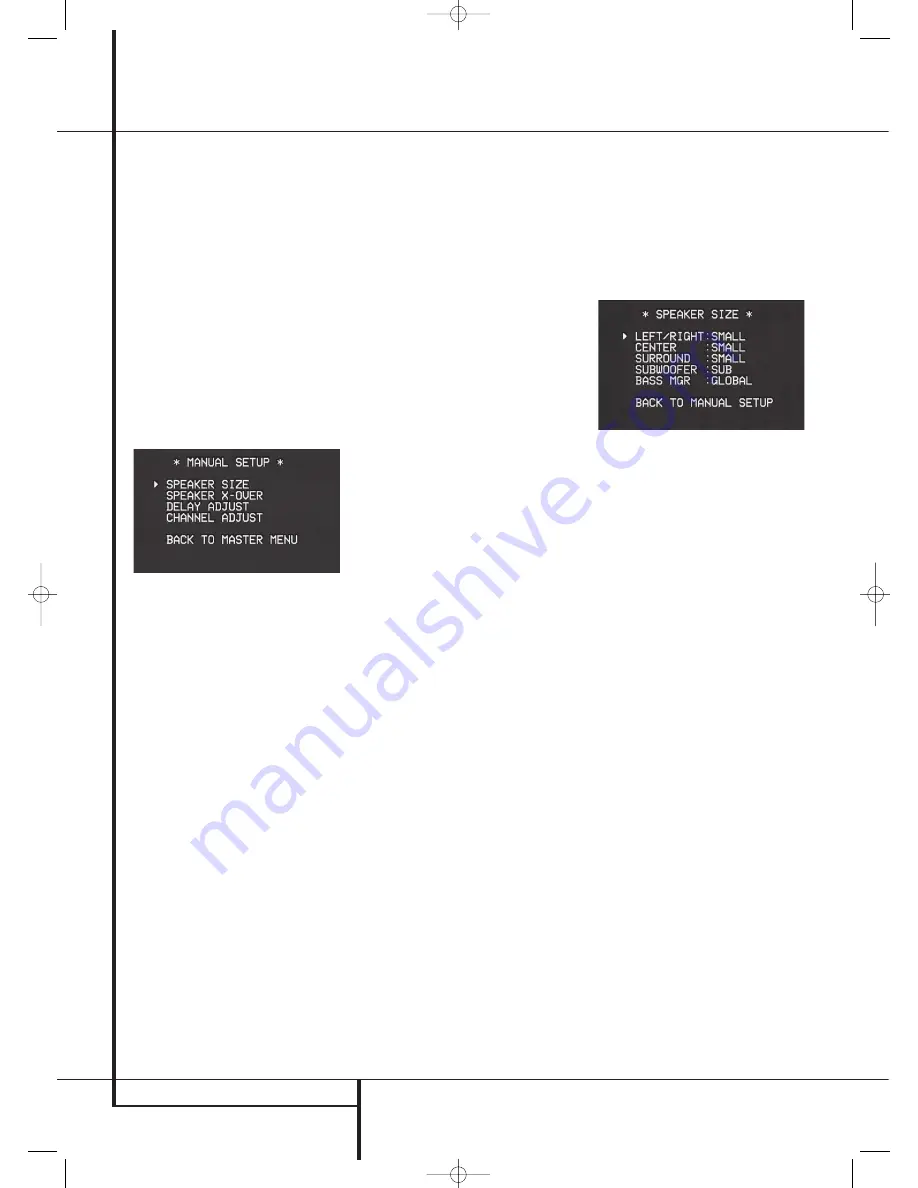
22
SYSTEM CONFIGURATION
System Configuration
Manual Setup
Harman Kardon recommends that you use the
EzSet procedure described on pages 21 to config-
ure your receiver for operation. However, you may
manually configure your AVR if you simply prefer
to make your adjustments manually.
To begin manual setup using the full-OSD menu
system, press the
OSD Button
v
so that the
MASTER MENU
appears on screen. Press the
⁄
/
¤
Buttons
p
until the
›
cursor points to
the
MANUAL SETUP
line, and press the
Set
Button
p
. The
MANUAL SETUP
menu
(Figure 8) will appear.
With the
MASTER MENU
on screen, press the
¤
Button
n
until the
›
cursor is pointing to
the
MANUAL SETUP
line, and press the
Set
Button
p
. The
MANUAL SETUP
submenu
will appear (see Figure 8).
Figure 8
Adjust the submenus in the
MANUAL SETUP
submenu in order, as some settings require that
previous settings be established first.
Speaker Setup
This menu tells the AVR which type of speakers
are in use. This is important as it determines
which speakers receive low-frequency (bass)
information.
For each of these settings use the
LARGE
setting if the speakers for a particular position are
traditional full-range loudspeakers that are
capable of reproducing sounds below 100Hz.
Use the
SMALL
setting for smaller, frequency-
limited satellite speakers that do not reproduce
sounds below 100Hz. Note that when “small”
speakers are used, a subwoofer is required to
reproduce low-frequency sounds. Remember that
the “large” and “small” descriptions do not refer
to the actual physical size of the speakers, but to
their ability to reproduce low-frequency sounds. If
you are in doubt as to which category describes
your speakers, consult the specifications in the
speakers’ owner’s manual, or ask your dealer.
At last, this menu also makes you chose if the
speaker setting will be the same for each input
source (
GLOBAL
), or will be set differently for
each input (
INDEPENDENT
).
Notes:
• When "Independent" is selected for the speak-
er settings (see below), they need to be made
for each input individually and you can deter-
mine which speaker should be used depending
on the input source selected. So it´s possible
e.g. to turn off the Center and/or the Sub with
any music source selected and to use them with
any movie input source.
• With the currently selected input all speaker
settings will be copied to all other surround
modes (as far as speakers are used with them)
and need not be repeated when another sur-
round mode is selected with that input.
It is easiest to enter the proper settings for the
speaker setup through the
SPEAKER SIZE
menu (Figure 9). So press the
OSD Button
L
to bring up the
MASTER MENU
(Figure 1), and
then press the
¤
Button
D
three times so
that the cursor is on the
MANUAL SETUP
line.
At this point, press the
Set Button
F
and
select the
SPEAKER SIZE
menu (Figure 9).
Figure 9
1. Before you start the speaker setting, you
should determine if you want all inputs being
configured with the same speaker size setting
(
GLOBAL
) or if all inputs should be configured
individually (
INDEPENDENT
).
To configure all inputs for "Global" or "Inde-
pendent" press the
⁄
Button
D
twice so that
the cursor is next to the
BASS MGR
line.
This setting allows you to use the same speaker
configuration for all inputs, or to have different
settings for each input. In most cases the factory
default setting of
GLOBAL
will be appropriate,
as most listeners do not need to have
individualized speaker settings. However, some
listeners, particularly those with full-range front
speakers that are used for both movies and music
may prefer that different speaker settings be used
when listening to music through a CD player as
opposed to a movie from a DVD player, VCR or
cable/satellite set top.
If you wish to customize the speaker size individ-
ually to each input, make certain that the cursor
is on the
BASS MGR
line and press the
‹
/
›
Buttons
E
so that
INDEPENDENT
appears in highlighted video. When this setting is
entered all speaker size settings will be shown
with their factory default size in the menu and all
other inputs will turn to
INDEPENDENT
too.
Now you should enter the speaker size settings
prefered for the input selected, as described
below. Remember that in this case the size set-
tings just entered will apply to the current input
ONLY, and you will need to go back to the
INPUT
menu to select another input, and then
return to this menu page again to change the
settings for the next input. Repeat the procedure
for any input where you wish to have a set of
speaker configuration different from the default
settings.
30935_AVR145_ENG 01/12/06 9:53 Side 22






























